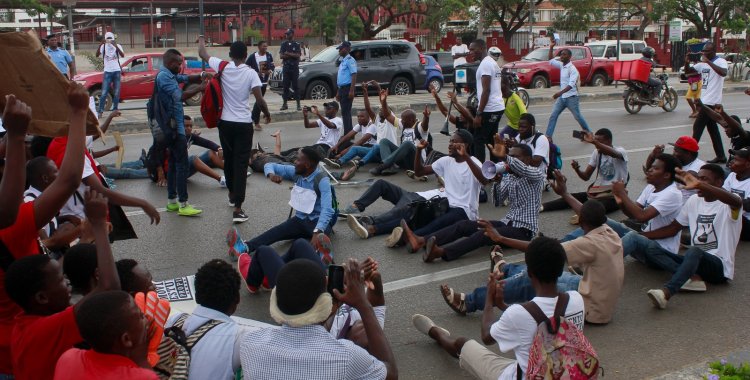For the Student Movement "Kickback No", the presidential decree approving the collection of tuition fees and emoluments in public higher education comes "to mourn the lives of students, mostly unemployed.
According to the leader of the movement, Arante Kivuvu, the diploma "will make life difficult for citizens, since a good number of students are unemployed and cannot afford to pay tuition and other fees", defending the "free" in this area.
"The issuing of certificates and diplomas has gone up, so we think the government is acting in bad faith, because at this time of quarantine is not the time to approve this law," he said, in statements to Lusa.
From the academic year 2021, public institutions of higher education will now charge tuition at 1900 kwanzas for the regular period and 15,000 kwanzas for the night period, according to a new fee schedule.
The table of fees and emoluments to be collected by public institutions of higher education is contained in the Presidential Decree No. 124/20 of May 4, which approves the Regulation on Fees, Fees and Emoluments in Public Institutions of Higher Education.
According to the regulation, already published in Diário da República, the collection and payment of fees and emoluments is aimed at "obtaining financial resources" that compete for a "provision of quality services in the fields of teaching, scientific research and university extension".
The table attached to the decree signed by the President, João Lourenço, also establishes several emoluments, namely 5000 kwanzas for enrolment in the entrance examination and 4000 kwanzas for enrolment and registration for the academic year.
For Arante Kivuvu, one of the members of the '15+2' process (group of activists arrested in 2016), after the quarantine period imposed by covid-19, the Student Movement "Propina Não" should take a stand and "demonstrations against the decree are not discarded".
"Because the decree does not favour students, and we have always said that with the implementation of tuition fees in public higher education, Angola's education goes into mourning, many will not be able to continue their studies", he stressed.
The civic activist believes, on the other hand, that the "current context obliges us to be free in this sub-sector of education", since "a good number of students are vulnerable and cannot afford these expenses".
"And the situation is aggravated by the economic crisis in the country and now more with covid-19. We think the decree kills the dreams of many young people", he stressed.
The Angolan Student Movement (MEA) also agrees with the student movement's position "Propina Não" (Kickback No) and states that the legal diploma expresses "the Angolan executive's lack of interest in training young people and providing a quality, excellent and dignified education".
"We have seen that most of the young people/students are unemployed, to implement payment of tuition fees in higher education during the work period is to end the dream of many who want to go to university," said the MEA's Assistant Secretary for Information, Teresa Joaquim.
For the associative leader, the emoluments expressed in the decree "are not acceptable in the context of the country, because most of us are unemployed and if we work the salary is not worth sharing.
The student card for public institutions of higher education will now cost 2000 kwanzas, the appeal examination 5000 kwanzas, declaration without marks 3000 kwanzas and declaration with marks 5000 kwanzas.
Classes in higher education have been cancelled in the country since March due to the state of emergency aimed at containing the spread of covid-19, which has so far caused 36 people to become infected and two deaths in the country.
The Ministry of Higher Education, Science, Technology and Innovation announced on Monday that the resumption of classroom activity, post-emergency due to covid-19, foresees classes on Saturdays for the fulfillment of curricular programs.
The academic year 2020 should last until January 2021, as the authorities expect.







